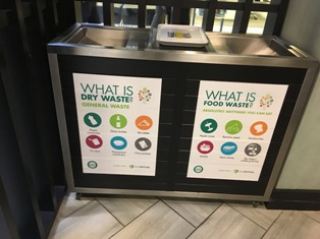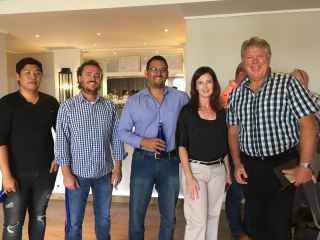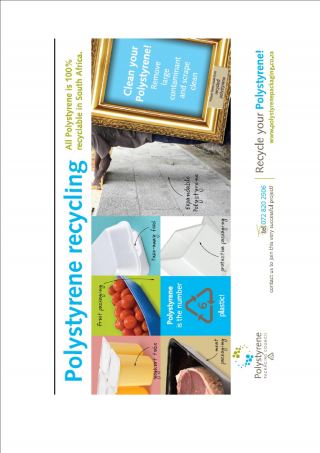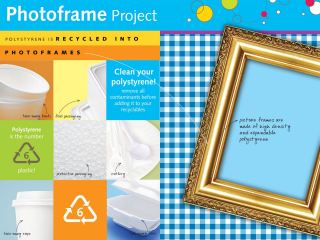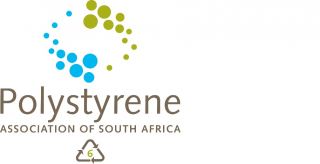PAUL JORDAAN APPOINTED PROJECT MANAGER FOR PRODUCT RECOVERY ORGANISATIONS
Paul Jordaan has been appointed Project Manager for both the Polystyrene Association of South Africa and the Southern African Vinyls Association (SAVA), with specific focus on providing assistance with their submissions for an Industry Waste Management Plan (IWMP), following the Department of Environmental Affair’s Section 28 call made to the paper & packaging industry, electrical & electronic industry and lighting industry.
Paul is a 26-year old Capetonian who matriculated at Paul Roos Gymnasium in Stellenbosch, before obtaining his BSc Agric Conservation Ecology degree from the University of Stellenbosch in 2015, for which he received cum laude distinction and the Daniel Booysen Award for his final year thesis. He went on to complete his Master’s degrees at the same institution, specialising in Sustainable Agriculture with his thesis entitled, "Evaluating the sustainable potential of biogas generation in South Africa".
Commenting on his new focus on the local waste management and industry recycling, Paul says he has been enjoying learning about the industry and getting to grips with some of the issues it faces. "It is a very exciting time to get involved with the plastics industry in particular, as there are many exciting opportunities and interesting developments that can be unlocked through the development of new end markets for recycled materials, contributing towards a more sustainable approach” he says.
“I believe that we are standing on the cusp of an era where great changes and radical movement towards a more sustainable way of life will be thrust upon us. For this reason, a conscious effort for improved environmental management and sustainability is of great importance,” Paul adds.
He is a passionate outdoorsman who loves working with people. Paul describes himself as an adventurous, passionate, driven, and patient person and looks forward to working with all the role players in the local plastics and recycling industries.
This email address is being protected from spambots. You need JavaScript enabled to view it. / This email address is being protected from spambots. You need JavaScript enabled to view it. or call him on (060) 972-6170
The Polystyrene Association and Mutualpark join forces to increase corporate recycling
Old Mutual’s Mutualpark in Cape Town is one of the largest corporate head offices in South Africa. With more than 9 000 employees working at this 166 000 m² office space, it is to be expected that a lot of waste would be generated at these premises on a daily basis. However, operating as a Responsible Business is at the heart of Old Mutual’s strategy and is embedded into their operations, culture and shared value strategy. The essence of shared value is to ultimately create mutually beneficial value - not only for Old Mutual’s shareholders in terms of being a profitable business but also for the benefit of all stakeholders, including the communities in which Old Mutual operates.
Environmental sustainability is one of the five pillars of Old Mutual’s Responsible Business strategy and thanks to the concerted efforts of the Mutualpark Waste Management programme, the company has managed to divert waste from landfill to more optimal and useful source streams. Moreover, it strives to educate visitors and employees alike about the importance of recycling. Old Mutual as a leading responsible business in the investment, savings, insurance, and banking sector has become a shining example of how to find opportunities and innovative ways to live and work that are sustainable and environmentally conscious.
“We conducted a waste audit at Mutualpark in 2015, after which Old Mutual developed an integrated waste management policy which formed part of our application to the Green Building Council of South Africa (GBCSA) to be recognised as a Green Building. Upon completion of this submission, Old Mutual was proudly awarded a 5-star rating under the existing building rating category – making the company the largest, existing building to achieve the level of environmental excellence in the Southern Hemisphere,” says Executive General Manager, Heloise van der Mescht.
According to Van der Mescht, Old Mutual acknowledges and embraces the value of an effective waste management strategy and for this reason began to separate and divert its waste into correct streams at source.
“This strategic approach to find better, more environmentally friendly and sustainable ways of working, has assisted us to have more control over our resources. It has allowed us to run better, more cost efficient operations and enabled us to reduce areas of risk, while simultaneously being committed to being environmentally responsible,” she says.
One of the environmentally responsible areas that Old Mutual is currently pioneering in the field of recycling is their recent partnership with the Polystyrene Association of South Africa. According to Adri Spangenberg, CEO of the Polystyrene Association, Mutualpark has various cafeterias and food outlets on its premises.
“Old Mutual employees, as in many companies, utilise polystyrene packaging such as hamburger clamshells and coffee cups for their take-away lunches and refreshments throughout the day. This was an obvious area for responsible intervention and consideration,” Spangenberg says.
A few months ago Old Mutual did try to switch to alternative food packaging and take-away containers, but these more environmentally friendly alternatives worked out to be far more expensive and were regrettably not a financially viable option for the onsite food outlets.
“We also found that many of the other packaging options were not as effective and in many cases were not readily recycled,” Van der Mescht stated. “In our search for a viable alternative, we were delighted, when 18 months ago, we discovered that there is a market for post-consumer polystyrene and that it is recycled into a wide variety of different products. It was on that basis that we were ready to go back to the polystyrene and our partnership with the Polystyrene Association began,” she says.
The polystyrene waste that is generated from the Mutualpark premises gets cleaned by a dedicated team of workers on site, who then ensure that the packaging is collected and baled. Approximately 50 bales of polystyrene are collected every 6 weeks by Greenlite Concrete for use in lightweight concrete and screeding applications. The left-over food waste is also attended to and sent to a nearby fly farm in the Western Cape. In addition, the Polystyrene Association has committed to assist Mutualpark with ongoing educational campaigns aimed at reaching employees and visiting customers as well as the surrounding communities in Cape Town about the importance of recycling polystyrene.
“We are also hoping to identify an Old Mutual beneficiary in need of a new building that can be built with their polystyrene donations. Other large corporates who want to follow in Mutualpark’s footsteps are welcome to contact us to discuss ways in which we can encourage their employees to also become responsible corporate citizens and avid recyclers who not only benefit the environment, but their communities as well,” Adri concludes.
For more information, visit www.polystyrenesa.co.za
-- ENDS --
Issued on behalf of the Polystyrene Association of SA For more information or media enquiries, please contact:Monique HoltzhausenAim Marketing & Communications ConsultantsTel: (021) 531-0313Cell: (071) 083-5219Email: This email address is being protected from spambots. You need JavaScript enabled to view it.
POLYSTYRENE ASSOCIATION WELCOMES NEW PROJECT COORDINATOR FOR BREADTAGS FOR WHEELCHAIRS PROJECT
The Polystyrene Association has appointed Patricia February as Project Coordinator for its rapidly growing Breadtags for Wheelchairs Project.
Patricia will be based full time at the Association’s offices in Stellenbosch and will be responsible for providing administrative support, managing the queries from collectors and coordinators as well as oversee the logical process of getting the polystyrene collected to recyclers who are based around the country.
She is no stranger to administration and office management, having worked in the hospitality industry overseas and in recruitment prior to joining the Polystyrene Association at the beginning of April 2018.
“I am very grateful and excited about this amazing opportunity. Although it is a completely new and different environment for me, I am finding it to be very interesting. I am looking forward to working with new people and building good relations with everyone involved,” she says.
Patricia has been married for 11 years and is the proud mother of Lyle (aged 10) and Mia (aged 3). In her free time, she enjoys spending time with her friends and family and describes cooking as her passion.
To contact the Polystyrene Association, call (+27 72 820 2506 or +27 87 087 0418) or email This email address is being protected from spambots. You need JavaScript enabled to view it. ENDS
Polystyrene Association links important Members of Value Chain
The Polystyrene Association of South Africa managed to take an important step forward towards mapping out the future collection, recycling and selling of polystyrene packaging by hosting a Value Chain Meeting in Cape Town recently.
Attending the inaugural meeting were some of the country’s biggest retailers, representatives of the Department of Environmental Affairs (DEA), local municipalities, manufacturers of polystyrene packaging products, waste management companies, collectors and recyclers.
Plastics|SA’s Executive Director, Anton Hanekom, facilitated the round table discussions that focused on finding solutions for the challenges currently being experienced with the collection and recycling of polystyrene and trying to find win-win solutions that would benefit the entire industry.
“The aim of the today’s meeting is to raise and talk about the issues that are important to all of us and to create a platform for dialogue,” Hanekom said as he opened the day’s discussions. “Today’s deliberations are very important for the plastics industry as a whole, because it is the first time that we get all these role players representing the entire value chain around the same table. The solutions we develop coming out of this get-together today, has the potential to produce positive ripple effects that are far reaching”.
Hanekom reported 47 % of plastics packaging that was collected for recycling in 2016, which equates to 309 520 tons, was manually recycled and successfully diverted from our country’s landfills. Of this, 5 449 tons were polystyrene that was recycled into new products such as seedling trays, retail coat hangers, cutlery, furniture components and picture frames.
Adri Spangenberg, Director of the Polystyrene Association, confirmed that the polystyrene food packaging industry equates to 25 000 tons produced in South Africa. “South Africa currently has 27 recyclers on record converting recyclable high impact and expanded polystyrene into raw materials or cement blends. Only 5 recyclers are responsible for 70% of the tonnages,” she said.
Don MacFarlane, Packaging Manager of Woolworths, representing one of the voices of the country’s retailers, stressed that packaging must be a mirror that reflects the lifestyle and ideas of our generation. He called for consistent, accurate communication to the public and the members of the value chain regarding which material is currently recycled in South Africa.
“It is clear some confusion exists in the market and the industry regarding the green credentials and recyclability of plastics. There is also a difference between which materials are recyclable and which are currently being recycled,” MacFarlane noted. “I have no doubt that plastic is the packaging medium that will take us into the future. However, how we manage this packaging material is important. As retailers, we are driven by the voice of our customers. Collaboration between key role-players is critical to change this classification and to avoid polystyrene from being eliminated,” he said.
The round-table discussions made it clear that there was a great demand for post-consumer polystyrene by recyclers who need in excess of 500 tons per month to sustain their operations. However, a bottle neck exists between the waste management companies and collectors of the material and the recyclers. more 2/…value chain meeting two“Logistical and capacity issues lie at the centre of the problem. However, the players have all showed a commitment to work together to find a workable solution. From our side, the Polystyrene Association has begun talks and tabled plans to subsidizing logistics with facilities both in the Western Cape and Gauteng, where our biggest markets are at the moment. We are also working on securing alternative funding and finalising our submissions for the Industry Waste Management Plan.
“There is a huge demand for polystyrene to be recycled in South Africa thanks to the various end-markets that we have developed. Coming out of the first value chain meeting, was the formation of a smaller task team consisting of ten role players who have volunteered their time to take the discussions further. We are excited to report back in due course on possible solutions and what the next steps will be to solve the stumbling blocks that we had identified,” Adri concluded.
For more information, visit www.polystyreneassociationsa.co.za
ENDS
5-Year Old Spina Bifida sufferer get a Gift of Mobility
The life of 5-year old Buhlebenkosi Mene from Kraaifontein was forever changed thanks to the donation of a much-needed wheelchair that was purchased for her through the Breadtags for Wheelchairs Project and the WP Stormers Rugby team.
Buhlebenkosi was born with Spina Bifida – a birth defect that occurs when the vertebrae don't form properly around part of the baby's spinal cord. “She won’t ever be able to walk and I have to carry Buhle everywhere we need to go. She is growing and getting too heavy for me, but we don’t have the money to buy a wheelchair for her,” explained her mother, Zikhona Mene.
Each year, close to 300 wheelchairs are handed over to recipients thanks to the collection of the breadtags which are made of high impact polystyrene (HIPS). These plastic closures have a high recycling value and the Polystyrene Association has established a network of buyers around the country who have agreed to pay R8.00 for each kilogram of bread tags. Once enough tags have been collected to cover the cost of the wheelchair selected, this money is then paid over to the pharmacy or wheelchair supplier of their choice.
“DB Janse van Rensburg is a Grade 11 pupil at the Paul Roos Gymnasium in Stellenbosch and one of our most enthusiastic collectors,” explains Adri Spangenberg, Director of the Polystyrene Association and administrator of the Breadtags for Wheelchairs Project. “He heard about the Buhle’s plight and encouraged his fellow pupils, the local community and the Stormers rugby team to become involved through his friendship Stormers flyhalf and ex-Paul Roos pupil, with Damian Willemse,”, she said.
A temporary wheelchair was handed over to an excited Buhle at the Tygerberg Association for Persons with Physical Disabilities by Van Rensburg and Willemse. “Because it is important to ensure that the correct wheelchair is purchased when seating quadriplegics, the QuadPara Association of South Africa (QASA) assesses the requirements of each wheelchair recipients and ensures they get the right chair for their needs. In the interim, little Buhle will have been given the gift of mobility and a wheelchair with which she can get around,” Adri clarified.
“We are very excited to be part of this project and to have been able to improve the life of this little girl. As part of National Disability Rights Awareness Month (3 November – 3 December), we want to encourage people to start collecting their breadtags. It is amazing to think that something so small and easy to do can have such a big impact on the lives of other people,” Willemse said during the handover.
“Our sincere thanks goes to DB, the Stormers Rugby team and every volunteer who collects their breadtags. It is thanks efforts such as these and the support of large corporates such as SASKO and Zibo Containers that we have seen the project grow in leaps in bounds over the past 10 years. Today, we are proud to say that the Breadtags for Wheelchairs Project has not only diverted more than 5 tons of plastics from landfill in one year, but has grown into an international volunteer effort that has changed the lives of thousands of people.
For more information on how to get involved in the Breadtags for Wheelchair project, visit the Polystyrene Association’s website (www.polystyrenesa.co.za) or their Facebook page (www.facebook.com/#!/groups/btagsforwchairs).
-- ENDS --
Issued on behalf of the Polystyrene Association of South Africa by Aim Marketing & Communications Consultants. For more information or media enquiries, please call Monique Holtzhausen at Aim Marketing & Communications Consultants on (021) 531-0313 or (071) 083-5219. Alternatively email This email address is being protected from spambots. You need JavaScript enabled to view it.
South Africans Urged to Recycle their Polystyrene
What is white, light, considered of high value and, although made up almost entirely of air, is in very high demand? If you guessed polystyrene, you’d be 100% correct!
According to Adri Spangenberg, Director of the Polystyrene Association, expanded polystyrene is one of South Africa’s most commonly used materials relied upon by canteens and spaza shops owners and restauranteurs to keep their food or beverages hot or cold, as well as by retailers to protect high value items such as televisions or fridges owing to the material’s excellent insulation properties.
“Polystyrene, also known as Styrofoam, is also widely used by supermarkets to transport and pack their perishable food products such as meat, fruit and vegetables owing to the fact that polystyrene offers excellent insulation properties, extends the shelf life of food and protects its contents thus reducing spoilage or damage,” she explains.
Polystyrene consists of 96% air, which makes it incredibly lightweight. Whilst it is a positive attribute that greatly reduces carbon emissions during transportation, it also causes polystyrene products to easily be blown away by wind where it becomes visible litter found on beaches or along roadsides.
“Few people are aware that polystyrene is a valuable resource that is readily recycled in South Africa. Waste Management companies collect and supply post-consumer and post-industrial polystyrene products such as meat trays, hamburger clamshells and coffee cups to recyclers who use it to manufacture stationery, hangers, picture frames, cornices, curtain rods and skirtings. “In the most recent development it is mixed with a special cement mixture for use in building and construction,” Adri states.
Because of the development of these end-markets, the demand from recyclers currently outstrips the supply of the materials. To this end, South Africans are urged to remember to include their polystyrene into their clear recycling bags to prevent this valuable resource from ending up in landfills. Please remember to scrape or rinse your polystyrene before recycling it to ensure that all food left-overs have been removed. Recyclers readily accept all colours of products, including white, black, blue, yellow and pink.
“Polystyrene recycling has grown year-on-year to more than 4 200 tonnes last year, saving 162 350 000 litres of landfill space thanks to the various recycling projects. This is equivalent to 65 Olympic-sized swimming pools filled with polystyrene that was diverted from landfill, that at the same time helped to create more than 48 000 jobs in the plastics recycling industry. We are working tirelessly to ensure that recycling remains at the top of everybody’s environmental agenda and to raise awareness about the value of recycled polystyrene,” Adri concludes.
For more information about polystyrene recycling, visit www.polystyreneassociation.co.za
Polystyrene Recycling takes off in PE and Durban
What is white, light, considered of high value and, although made up almost entirely of air, is in very high demand? If you guessed polystyrene, you’d be 100 % correct!
The Polystyrene Association of South Africa has teamed up with Wildlands in Durban and Rhino Greenbuilding in Port Elizabeth to collect, process and supply post-consumer and industrial recycled polystyrene products to manufacturers - ultimately offering a solution that will prevent this valuable resource from ending up in these two cities’ landfill sites.
“Expanded polystyrene is one of South Africa’s most commonly used materials relied upon by canteens and spaza shops owners and restauranteurs to keep their food or beverages hot or cold, as well as by retailers to protect high value items such as televisions or fridges owing to the material’s excellent insulation properties,” explains Adri Spangenberg, Director of the Polystyrene Association of South Africa.
Polystyrene is widely used by supermarkets to transport and pack their perishable food products such as meat, fruit and vegetables owing to the fact that polystyrene offers excellent insulation properties, extends the shelf life of food and protects items against breakage.
“The wonderful thing about polystyrene is that the material consists of 96% air – making it incredibly lightweight. This has a significant impact on carbon emissions during transportation, but also unfortunately causes it to be easily blown away by wind where it becomes visible litter found on beaches or along roadsides,” Adri says.
Few people are aware that used polystyrene is a valuable resource that is readily recycled in South Africa. The collected polystyrene is put through an Ingot machine that transforms into a material used by recyclers for the manufacture of stationery, hangers, picture frames, cornices and skirtings. It is even mixed with a special cement mixture for use in building and construction.
“Polystyrene recycling has grown year-on-year to more than 4 200 tonnes last year, saving 162 350 000 litres of landfill space thanks to their various recycling projects. This is equivalent to 65 Olympic-sized swimming pools filled with polystyrene that was diverted from landfill, that at the same time helped to create more than 48 000 jobs in the plastics recycling industry,” Adri elaborates
Commenting on this exciting development, say Kaveer Singh of Wildlands and Jarred van Niekerk of Rhino Greenbuilding: “We are very excited to become part of this project that will not only divert a valuable item away from landfill, but also help to create jobs and support a growing industry”.
Business and residents in Port Elizabeth are encouraged to take their clean, white polystyrene to their depot situated 15 Voyle Street in Sydenham, while Wildlands readily accepts white and coloured polystyrene that is dropped off at its Recycling Depot situated in Cato Manor in the SPCA Excess Road.
“Every bit counts, and we are asking residents to please make sure that their material is cleaned and void of any left-over food, bones etc. We are working tirelessly to raise awareness about the value of recycled polystyrene amd ensure that recycling remains at the top of everybody’s environmental agenda. To this end, we hope to establish even more collection and recycling depots in and around Durban and PE in the near future,” she concludes.
For more information about polystyrene recycling, visit www.polystyreneassociation.co.za or call +27 72 820 2506
Alternatively email This email address is being protected from spambots. You need JavaScript enabled to view it. (Port Elizabeth) or This email address is being protected from spambots. You need JavaScript enabled to view it. (Durban)
Polystyrene packaging Council changes name
The Polystyrene Packaging Council – the Product Recovery Organisation (PRO) for Expanded Polystyrene (EPS) and High Impact Polystyrene (HIPS) in South Africa - has announced that it is changing its corporate name to the Polystyrene Association of South Africa.
“With the recent steps taken to formalize industry bodies representing the various PRO’s, and in our dealings with government and end-markets, it became clear that we needed to relook our purpose, role and positioning within the Industry Waste Management Plan (IWMP). Whilst technically Council is regarded a statutory body, we will not be fulfilling this role in light of the more formalized industry representation which is currently underway,” says Adri Spangenberg, explaining the rationale for the rebranding.
By far, the vast majority of PRO’s in South Africa are established as Voluntary Associations. In line with the general characteristics, the Polystyrene Association is regulated by Common Law, has an open membership and is managed from within by general members or a management/steering committee according to a Constitution drawn up by members.
“By doing away with the word “Packaging” in our name, we also wanted to include more players in the industry wanting to join us as members. The polystyrene market has grown considerably since we started more than 10 years ago, and participation is no longer just limited to the manufacturers of food packaging material. In addition, the IWMP requires all producers and convertors of polystyrene to support our objective of increasing the recycling of polystyrene through our various projects that all have a strong charity and social upliftment motivation,” Adri explains.
In step with the new developments, an updated logo has been unveiled, whilst the email addresses and websites will also gradually be changed and seamlessly be redirected to the new the Polystyrene Association URL.
South African industry leaders to address the Debt Collection Conference 2017
Johannesburg - High level representatives of companies such as ADRA, PASA, Debt Rescue, Callforce, MFSA, Consumer Profile Bureau, Cornerstone Performance Solutions, Flemix & Associates, OVAG SA, Burnard Raaff & Associates and Tenacity Financial Services and more to be attendance at the third annual Debt Collection Conference 2017.
The event, to be held on 6 & 7 September 2017 at Indaba Hotel, Fourways, Johannesburg, and hosted by Trade Conferences International (TCI), aims to attract professional dealing with debt collection, debt management, credit risk, debt & credit control, legal debt counselling & advisory, credit management as well as collection management and implementation.
Themes to be addresses includes current SA debt collection landscape,developing and managing strategies,focusing on customer engagement, credit risk management, governance, compliance and legal framework, new technology for efficient debt collection as well as the state, evolution and future of credit & debt collection industry.
Michandre Malan – Senior Project Manager at Trade Conferences International - said TCI has organised more than 400 events in the last fourteen years. Since we hosted the first Debt Collection in 2013, the event attracted over a 600 registered delegates and over 100 exhibiting companies includes: ABSA, African Bank, CrediCor, DirectAxis, Discovery, HTN Attorneys, PayM8, NRB Risk Solutions, Nedbank, FNB, Standard Bank, Uni-Collect, Woolworths Financial Services and more.This years’ conference is expected to attract over a 150 delegates.
“TCI is your technology event organiser of choice and we believe that the event will be a success. We understand technology and have the ability to identify the right audience to showcase the latest technology developments in different industries. The event will allow both exhibitors and delegates an opportunity to network and explore new developments in the debt collection and credit risk industry.”
Normal Registration fee: R8 600,00 + VAT = R9 804.00 p.p.
12% Discount: Group registration fee for 3 or more delegates: R7 568.00 + VAT = R8 627.52 p.p.
20% Discount Group registration fee for 5 or more delegates: R 6 880.00 + VAT = R7 843.20 p.p.
How to get invovled with this TCi signuture event:
To register as a delegate email Michandre Malan on This email address is being protected from spambots. You need JavaScript enabled to view it.. Exhibition enquiries are handled by Jason Joseph This email address is being protected from spambots. You need JavaScript enabled to view it., or call both on 011 803 1553.


